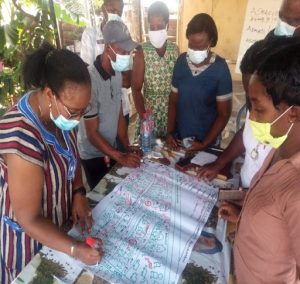Ghana: Linking communities, local government and health workers to support life cycle health promotion and prevention policies, programmes and services at the household and community level in urban poor neighbourhoods in Ghana.
 The Community Health Planning and Services (CHPS) concept was adopted in Ghana in 2005 as a national policy for the provision of primary health care (PHC) services, with a focus on ensuring that health care services are made accessible, equitable and efficient, and of good quality. The CHPS concept employs trained Community Health Officers (CHOs) that are assigned to deliver door-to door healthcare services to community members in various zones. Considering the successes chalked by the CHPS program in the rural areas in Ghana, the need arose to implement the program in urban settings.
The Community Health Planning and Services (CHPS) concept was adopted in Ghana in 2005 as a national policy for the provision of primary health care (PHC) services, with a focus on ensuring that health care services are made accessible, equitable and efficient, and of good quality. The CHPS concept employs trained Community Health Officers (CHOs) that are assigned to deliver door-to door healthcare services to community members in various zones. Considering the successes chalked by the CHPS program in the rural areas in Ghana, the need arose to implement the program in urban settings.
The implementation of CHPS in urban settings has however been plagued by many challenges due to the variations in the social networks in both settings, differences in disease burden and the structural and intermediate determinants of health. The urban health system continues to experience rising rates of non-communicable diseases, disparities in the wider determinants of health and poor collaboration between local government and the community. In addition, there is also limited free, quality primary health care despite the plurality of providers. Other challenges include lack of support from community members; poor referral system and flow of information between the CHOs and referral facilities; inadequate basic logistics to carry out duties; and difficulties involving community members as volunteers. In understanding the role of the CHPS program as a driver for Universal Health Coverage in urban poor areas, there is a need for collaboration among all stakeholders to improve PHC, hence the birth of this research project.
The project employs the Participatory Action Research (PAR) approach, which involves the people and communities under study as researchers and agents of change in the development of collective understandings and analyses of problems and their solutions. Evidence suggests bottom-up community engagement in health promises to be a great strategy towards enhancing trust and confidence in low resource countries such as Ghana. In developing the project, rich picture sessions were held with relevant stakeholders from local government, community members and health care facilities to brainstorm challenges with the urban health system and represent them visually with a system thinking mindset. A rich picture is a diagrammatic representation of a given situation showing relationships, interconnectedness and complexities. It is built through an iterative process of engagement and reflection with relevant stakeholders.
Problem analysis with opinion leaders, traditional leaders, religious leaders, community health workers, assembly members, community members, local government, and district health managers revealed multiple perspectives on the challenges identified, the relationships between stakeholders, and the extent of their engagement with one other. A general objective identified collaboratively for the project was to develop and co-produce with stakeholders, implement and evaluate a package of interventions that enables sustainable provision of life cycle health promotion and prevention programs and services at the household and community level for urban poor populations in Ghana.
Impactful public health research fosters good linkages among all stakeholders including community members, thereby enhancing ownership and accountability in service delivery. A Participatory Action Research Approach that also considers gender and intersectionality, can contribute to inclusion and empowerment of the marginalized to contribute to change, as well as challenging power imbalances in the communities where we work.